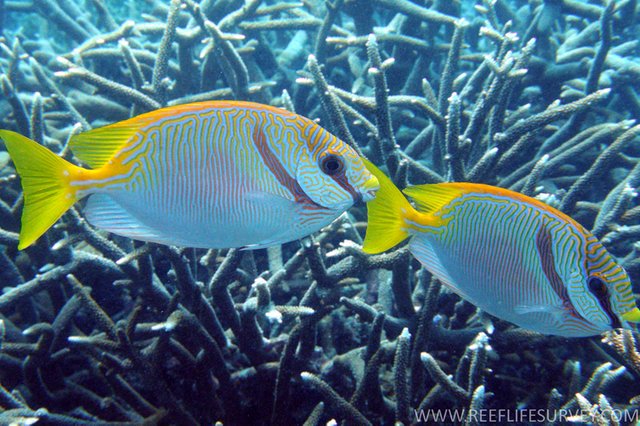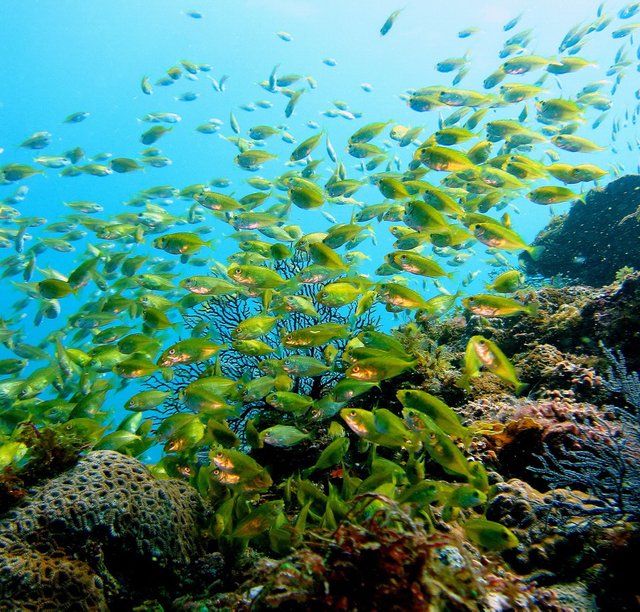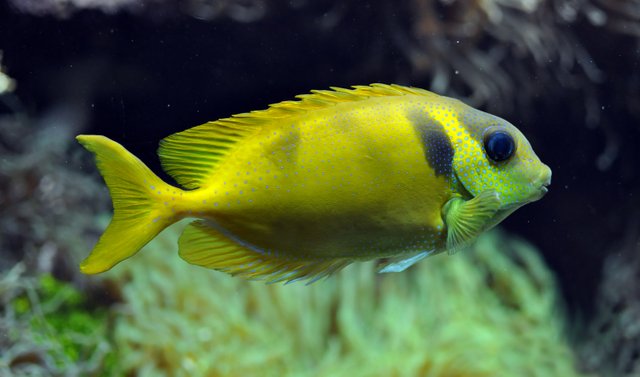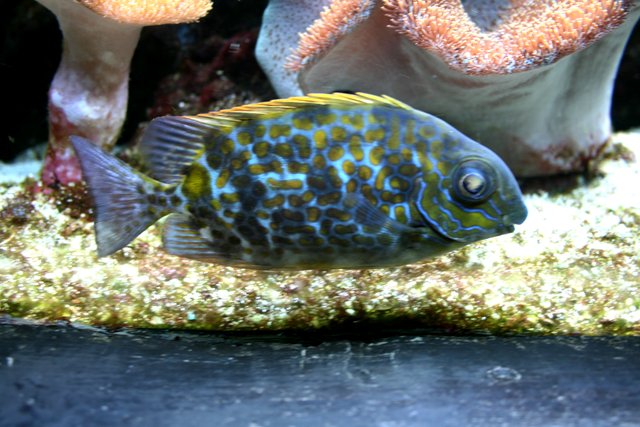Rabbitfishes (Siganus sp.) is the first fish species that have shown to have pairs that cooperate and support each other during foraging, a trait believed to be impossible for fish to have
Seeing pairs of birds or mammals that cooperate or help each other out when they are feeding is far from uncommon, and it is in fact a key benefit of forming a monogamous pair. This behavior has been documented in many different species with a different degree of monogamy, but has never been seen in any non-mammal or non-bird until very recently.

A rabbitfish pair. Image by T. Cooper, posted with the Creative Commons Attribution 3.0 Unported license.
A research team from ARC Centre of Excellence for Coral Reef Studies at James Cook University studied rabbitfishes (Genus Siganus), a genus that consists of about 28 different species. They are all found in the Indo-Pacific ocean, and form pairs for breeding and foraging. Parrotfishes eat benthic algae in the wild, but some species have also been observed to be eating prawns, fishing bait, comb jellies and jellyfish, so they are believed to be opportunistic omnivores that will eat anything that can fit in their mouths.
The parrotfish are pretty popular to keep as pets in fish tanks, but they are easily frightened, and will use their venomous spines to defend themselves if they feel threatened, so it’s not really encouraged to keep them. The poison will not kill a grown adult, but it is very painful, and some people have compared it to being stung by a lionfish (Genus Pterois)!
Anyway, I want to take a closer look at how these parrotfishes exhibit reciprocal cooperation during foraging like I mentioned in the title, but first we need to understand what exactly that is.

A school of parrotfish. Image by Vincent C. Chen, posted with the Creative Commons Attribution-Share Alike 4.0 International license.
What is reciprocal cooperation?
Reciprocal cooperation is when one organism temporarily reduces their own fitness to improve the fitness of other organism. That was a pretty heavy biological definition, so let’s rephrase it to when one individual reduces their own chance of survival in order to help the other individual improve theirs. As said, there are many examples of this in the mammal and bird communities, such as when one individual is sharing food, or pretty much anytime someone helps someone else without an obvious advantage to the helper.
The thing about reciprocal cooperation is that it is based upon the expectation that the favor will be returned at some point. It makes no sense to share your food if you don’t expect the other organism to share their food at one point, so it works on a “tit for tat” strategy.

Image by Citron / CC-BY-SA-3.0.
While this might sound pretty easy and internalized to us humans, this survival strategy is thought to require complex social and cognitive skills. For this reason scientists have assumed that it would simply be impossible for any species of fish to exhibit this behavior.
The scientists found behavior of reciprocal foraging cooperation in the rabbitfish
Let’s return to the research by ARC Centre of Excellence for Coral Reef Studies. Their study found clear signs that the parrotfish pairs would exhibit reciprocal cooperation when foraging for algae. This was observed when pairs foraged together, and one member of the pair would assume a vigilant position where it was on the lookout for intruders, while the other member found focus on eating algae. After a little while the members would change positions, suggesting that they had a balanced distribution of foraging activity.
When the one member is on the lookout for predators while the other is foraging, it is increasing its chances of being eaten, since it would be better off to go hide while the other member ate. However, the study also found that the member who was foraging had on average better success compared to individual rabbitfish who foraged alone. This further suggests that the cost of being on the lookout for your partner is outweighed by the gain from a better forage.
All in all, there is strong evidence that these fish exhibit reciprocal cooperation, even though we did not expect fish to be able to do this!

Image is Public Domain.
Could fish have more social behavior then we expect?
The commonly accepted notion of the fish have always been that they are pretty straightforward creatures that fend for themselves, and don’t really exhibit complex social behaviors. However, studies like this could begin to change how we look at the fish in general, and it will be exciting to see if we can find even more complex social behavior in fish from now on.
Thanks for reading
Thanks for reading about how the rabbitfish exhibit reciprocal cooperation. I hope you enjoyed the post, and please let me know if you have any questions. The link to the study is further up in the text. Also keep in mind that the study itself is a few years old, so it’s not brand new like most studies that I write about.
And to end, let’s have a bonus grammar funfact: You might notice that I write rabbitfishes, but commonly refer to multiple fish as fish, not fishes (which is how it is supposed to be). When using the word fishes we refer to multiple species of a fish genus, while the word fish can be used to refer to several fish of the same species. Alright, enough grammar fun for now.
About @valth
Hey, I'm @valth - the author of this post. I love to write about nature, biology, animals, nature conservation, ecology and other related branches of science, and I occasionally write about my life, about Steem or about random stuff as well. I'm trying my best to write at least one post every day, so make sure to give me a follow if you enjoy my content and want to see more of it.
Join the @valth community!
I love nothing more than to engage with my readers, so please join the @valth community in the comment section. You will definitely find more information about the topic, personal experiences, questions, and even opposing views down there, so don't miss out on learning more.
I always reward users who post good comments, so please take the opportunity to share your views and get a small upvote in exchange for it.
One of the things which flummoxed ecologists for a long time was why they then see altruism in cases where reciprocation is not expected or even possible. The big example is the case of eusocial insects where a large part of the hive are drones which do not reproduce. The question was why do they help the hive if they have no chance to pass on their genes to their offspring. The answer, formulated significantly by E. O. Wilson, is that although drones don't directly reproduce, they are very close genetically to the queen, so by helping the hive, they do actually help to ensure their genetic legacy.
Indirect genetic propagation has all sorts of interesting implications. For example, it has been used to explain why we're much more likely to help people who resemble ourselves. Taken to an extreme, it may explain the basic biological reason for 'us' and 'them' mindsets.
For me, a really interesting offshoot of this is the study of 'cheaters'. Basically, in an cooperative system, there are some individuals who won't contribute but will still gladly benefit. How they manage to cheat, and the percent of population which can get away with it are both pretty interesting questions. For example, the Myxococcus 'wolf pack' bacteria I wrote about* a while ago have plenty of cheaters in their colonies are are, in fact, studied for that reason.
*I'm not linking to my own writing as I'm not sure if that's in-line with Steemit's etiquette, if it's allowable, please do let me know.
Great comment, @effofex! You bring up some interesting points, and I think it's very interesting to see how indirect fitness impact not only the animal kingdom, but also the life choices we see in the human race.
Another thing about this to keep in mind is that since the drones are often very genetically alike to the queen, they often have more DNA in common with the other drones than the rest of us have with our offspring. We tend to have 50 % shared genes with our children, while some of these eusocial insects can have up to 75 % shared with the other drones.
Cheaters is also an interesting subject, and I guess most of it could be explained by game theory, which I'm personally not very good at. Hehe
It all depends on the author of the post I guess. Some might feel like it's not cool, but I'm fine with it as long as it's relevant, which it clearly is in your case :)
Thanks again for a great comment, and have a nice day!
Best regards from @valth
Hi @Valth
This is an interesting topic!
I remember an interview with the author of the book "What a Fish Knows" written by Jonathan Balcombe on Mysterious Universe a couple of years ago and got blown away by the stories he told.
One of the examples I remember from the interview was a fish who picked up a stone from the fish tank floor and knocked it against the glass to get attention from one particular human in the family.
As long as we use fish as a food source many of us is probably hesitant to admit that our aquatic friends is intelligent and have a "Social life" of their own. Also, the lack of similarities to more familiar mammals their expressions and behaviors could be harder do decode.
Cheers, Erlend
Hi, @erlendgroseth.
That's an incredible story. I have also read about how some people have been training goldfish to swim in mazes, so they can definitely be trained to to stuff like this. But it's even more cool if the fish learned this by itself.
I agree with the points you are making regarding the fact that we might not want to accept their intelligence and social life, because then we would hae to feel bad about eating them, or treating them bad when keeping them in small fish tanks.
I always advocate that there is so much little we know of our planet and the species that live here....
Marine life is far more under-discovered and under-rated....
Our technological acumen and capabilities are way under-developed when it comes to oceans....
There are so many dark corners and depths that are still to be discovered and explored..
Yeah, we probably know more about what things at like at the surface of the moon or Mars, than we know of what it's like on the bottom of the ocean!
Just imagine all the things we would learn about if we spent 1/10th of the money we do on space technology on marine discovery.
Yeah nice proposition. ....But marine exploration is quite a tedious task requiring a lot of technological impetus and financial input...
Even we haven't fully explored the outer layer of earth's crust (lithosphere)...
Yeah, that's a good point. But it will be interesting to see if humans will explore more of the ocean in the coming decades, and I think we will find lots of cool discoveries in the ocean :)
This article may interest you. They left out most of the Evolutionary Game Theory math, unfortunately, but it is still interesting as an overview.
Thanks for the link, @ocrdu. Altruism in animals is a really interesting subject, and there is a lot of debate regarding it as well.
I loved your gramatical touch and explained it to my 5 year old niece...She loved the rabbit fish pair and asked me for gift of a pair on her birthday...I smiled and kissed her:)
Amazing these children and fishes are!!!
Hehe, that's a cute story :)
I have a strong interest in aquatic life - marine & freshwater. Until I read your post, I had no prior knowledge of reciprocal cooperation. I learned something new today. Thank you!
Hi, @acdevan. I'm glad you learned something new today! And I have the same interest as you; the life in water is really cool to study :)
So rabbit fishes are socially active. May be all animals are socially active and we cannot understand due to lack of knowledge. Thanks for sharing
Thanks an interesting thought. But you're on to something; if the way they are social is very different from how we are social, finding out about it can be very tricky!
We are more social because we keep a far better brain than these animals, but our understanding about animal psychology is still little. Hopefully we will have a far better understanding as the science progress.
It's wonderful that this ability of fish is being discovred. Fish are capable of so much more than most people realize.This asset can be a lesson for us that" Not every relationship is about sex".
Yeah, I agree with you. A lot of fish are really interesting animals, and I think the reason why we don't think better of them is because they can be difficult to study, since we either need to put them in an aquarium (and not get to study their natural behavior), or we have to dice in the ocean to look at them. It is really difficult to make studies like this one, but I hope we learn more about fishes in the future!
Pretty cool! Love when we find things that prove our assumptions are incorrect :)
I agree, those type of discoveries are the best :)
A very informative article that, frankly I did not know the informations contained in it before, thank you very much for the effort provided to provide this content.
The sea is a world that remains untouched and many of its secrets are not yet revealed.
Thanks! I'm glad you liked it :)
Yes, there is so much stuff we don't know about the ocean and the animals living in it! There is a huge potential for scientific discovery down in the deep :)
These Fishes are so beautiful . . . . i have never seen these before, now i searched about it and found that they change color almost instantly to match the surroundings.
@valth, are these fishes available in shops?
Yeah, they are really amazing!
Yes, as I said in the post, you can have these in your aquarium if you are willing to take the risk of being stung.